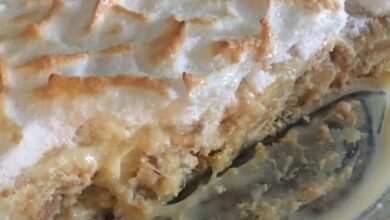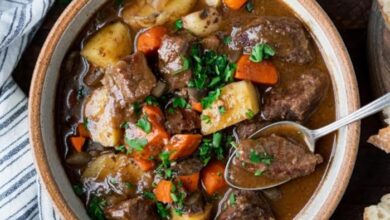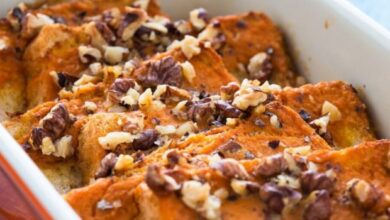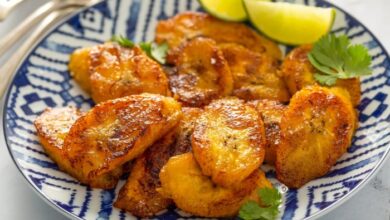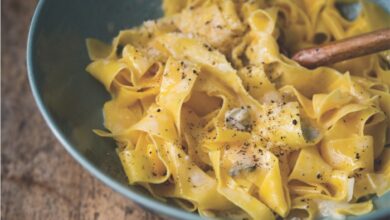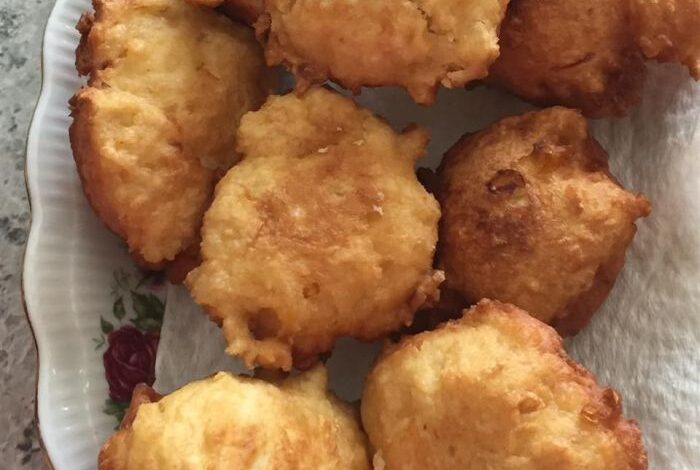
Corn Fritters with Maple Syrup: A Sweet and Savory Delight
Corn fritters with maple syrup – the name itself evokes a sense of warm, comforting nostalgia. These golden-brown, crispy treats are a staple in many kitchens, and for good reason. They offer a delightful blend of sweet and savory flavors, making them perfect for any occasion.
Whether you’re looking for a quick and easy breakfast option, a satisfying snack, or a unique side dish for your next dinner party, corn fritters with maple syrup are sure to please.
The history of corn fritters dates back centuries, with variations found in various cultures around the world. From the simple cornmeal fritters of the American South to the more elaborate versions with spices and cheese, these humble treats have captured hearts and palates for generations.
In this blog post, we’ll delve into the fascinating world of corn fritters, exploring their history, ingredients, preparation techniques, and serving suggestions. We’ll also uncover the secrets to achieving the perfect texture and flavor, ensuring your corn fritters are as delicious as they are beautiful.
History and Origin of Corn Fritters: Corn Fritters With Maple Syrup
Corn fritters, those golden-brown, crispy treats, have a history as rich and flavorful as their taste. Their origins can be traced back to ancient times, with variations popping up across the globe, each reflecting the local culinary traditions and ingredients.
The Origins of Corn Fritters
Corn fritters, in their simplest form, are a testament to the ingenuity of early civilizations in utilizing readily available ingredients. Evidence suggests that corn fritters, or similar variations, were enjoyed in various cultures long before the advent of modern cuisine.
In Mesoamerica, where corn originated, ancient civilizations like the Aztecs and Mayans incorporated corn into their diet in diverse ways. They ground corn into masa, a dough used to create tortillas, tamales, and other dishes. While specific evidence of corn fritters during this era is limited, the use of masa as a base for fritters is a strong indicator of their early existence.
Cultural Significance of Corn Fritters
Corn fritters have become a staple in many culinary traditions, each region adding its own unique twist to the recipe. In the Southern United States, corn fritters are a beloved breakfast or brunch dish, often served with syrup or honey.
They are a testament to the region’s agricultural heritage, utilizing locally grown corn and incorporating the flavors of the South. In the Caribbean, corn fritters, known as “accras,” are a popular street food and are often enjoyed as an appetizer or snack.
They are typically made with cornmeal, flour, spices, and herbs, and are often served with a dipping sauce.
Traditional Methods of Preparing Corn Fritters
The preparation of corn fritters varies across cultures, but some common techniques have been passed down through generations.
- Using Cornmeal:Cornmeal is a key ingredient in many traditional corn fritter recipes. It provides a slightly coarse texture and a distinctive corn flavor. The cornmeal is often mixed with flour, eggs, milk, and spices to create a batter that is then fried in oil until golden brown.
- Adding Sweetness:Sugar or honey is often added to corn fritter batter to enhance their sweetness. This is particularly common in Southern and Caribbean recipes. The sweetness complements the savory corn flavor and adds a touch of indulgence.
- Incorporating Herbs and Spices:Herbs and spices are often used to add flavor and complexity to corn fritters. Common additions include chives, parsley, garlic, and black pepper. These ingredients not only enhance the taste but also add a touch of color and aroma.
- Frying Techniques:Deep-frying is the most common method of cooking corn fritters. The hot oil ensures that the fritters are cooked through and develop a crispy exterior. However, some recipes call for shallow-frying or even baking, depending on the desired texture and flavor.
Ingredients and Variations
Corn fritters are a versatile and adaptable dish that can be customized to suit your preferences. The basic recipe calls for a few essential ingredients, but there are many ways to add your own personal touch.
Essential Ingredients
The foundation of a classic corn fritter recipe lies in a few key ingredients:
- Cornmeal:The cornerstone of corn fritters, cornmeal provides the texture and flavor. Different types of cornmeal can significantly impact the final product.
- Eggs:Binding the ingredients together, eggs contribute to the fritter’s structure and richness.
- Milk or Buttermilk:Adding moisture and tenderness, milk or buttermilk helps create a cohesive batter.
- Flour:Often a small amount of all-purpose flour is used to enhance binding and ensure the fritters hold their shape.
- Baking Powder:A leavening agent that creates light and airy fritters.
- Salt and Pepper:Seasoning to enhance the flavor profile.
- Corn:Fresh or frozen corn kernels add a sweet and juicy element to the fritters.
Common Variations and Additions
The beauty of corn fritters lies in their adaptability. Here are some common variations and additions that can enhance the flavor and texture:
- Herbs:Fresh herbs like chives, parsley, cilantro, or dill can add a vibrant burst of flavor.
- Spices:Experiment with spices like paprika, cumin, cayenne pepper, or garlic powder to add depth and complexity.
- Cheese:Grated cheddar, Monterey Jack, or even crumbled feta can add a savory and melty element.
- Vegetables:Chopped bell peppers, onions, zucchini, or jalapenos can add texture and flavor.
- Sweet Additions:For a sweeter twist, try adding a touch of sugar or honey to the batter or drizzling with maple syrup after frying.
Impact of Different Cornmeal Types
The type of cornmeal used can significantly affect the texture and flavor of the fritters:
- Fine Cornmeal:This type results in a smoother, more delicate texture, often used for traditional cornbread.
- Medium Cornmeal:A good all-around choice, offering a balance between texture and flavor.
- Coarse Cornmeal:Produces a grittier, heartier texture, often used for polenta or cornbread with a rustic feel.
“The type of cornmeal you choose will significantly impact the final texture and flavor of your corn fritters. Experiment with different varieties to find your favorite.”
Corn fritters with maple syrup are a delightful treat, especially when paired with a hearty main course. For a satisfying dinner, I recommend trying Marie’s easy slow cooker pot roast , which is incredibly flavorful and tender. The combination of sweet and savory flavors creates a truly satisfying meal, and the corn fritters offer a light and crispy counterpoint to the rich pot roast.
Preparation Techniques
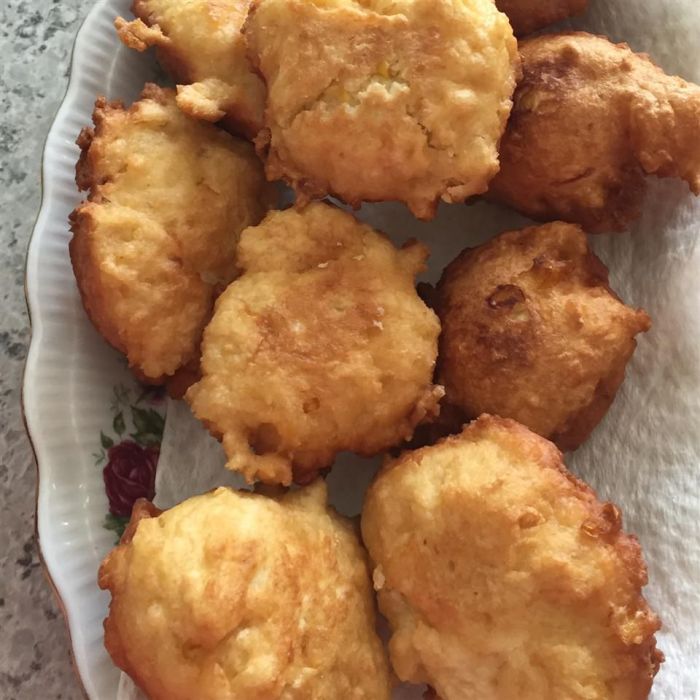
Corn fritters are a versatile and easy-to-make treat that can be enjoyed in a variety of ways. The preparation techniques are straightforward, but there are a few key steps that can help you achieve the perfect texture and flavor.
Corn fritters with maple syrup are a classic comfort food, but sometimes you crave something a little more savory. If you’re looking for an easy, cheesy, and satisfying snack, check out these easy cheesy hot dog crescent rolls.
They’re a perfect combination of salty and sweet, and they’re sure to please everyone at the table. After all, who can resist a warm, gooey crescent roll filled with cheese and hot dog? Once you’ve satisfied your savory cravings, you can always go back to those delicious corn fritters with maple syrup!
Mixing
Mixing the batter is the first step in making corn fritters. The batter should be thick enough to hold its shape but not too thick that it’s difficult to stir. You can achieve this by using a combination of wet and dry ingredients.
The wet ingredients include corn kernels, eggs, milk, and flour, while the dry ingredients include baking powder and salt.
- In a large bowl, whisk together the wet ingredients, ensuring the corn kernels are evenly distributed.
- In a separate bowl, whisk together the dry ingredients. This helps to ensure that the baking powder is evenly distributed, which is essential for a light and fluffy texture.
- Gradually add the dry ingredients to the wet ingredients, mixing until just combined. Overmixing can result in tough fritters.
- Fold in any additional ingredients, such as herbs, spices, or cheese, until they are evenly distributed throughout the batter.
Shaping
Once the batter is mixed, you can start shaping the fritters. You can use a spoon, a cookie scoop, or your hands to shape the fritters. The size and shape of the fritters will depend on your personal preference.
- Using a spoon, scoop out the batter and drop it into hot oil. You can also use a cookie scoop to ensure consistent size and shape.
- If you prefer to shape the fritters by hand, use a tablespoon of batter and gently roll it into a ball or patty.
- You can also flatten the fritters slightly to create a more pancake-like shape.
Cooking
The cooking method you choose will determine the texture and flavor of your corn fritters. You can fry, bake, or grill them. Each method has its own advantages and disadvantages.
Frying
Frying is the most common method for cooking corn fritters. It results in a crispy exterior and a soft, moist interior.
- Heat a generous amount of oil in a large skillet over medium heat. The oil should be hot enough to sizzle when you add a small piece of batter.
- Carefully add the fritters to the hot oil, making sure not to overcrowd the skillet. If you overcrowd the skillet, the temperature of the oil will drop and the fritters will not cook evenly.
- Cook the fritters for 2-3 minutes per side, or until golden brown and crispy. You can use a spatula to flip the fritters halfway through cooking.
- Remove the fritters from the skillet and drain them on paper towels to absorb excess oil.
Baking
Baking is a healthier alternative to frying. It results in a less crispy exterior but a soft and moist interior.
Corn fritters with maple syrup are a classic comfort food, but sometimes you want something a little more substantial. That’s where creamy make-ahead mashed potatoes come in! They’re the perfect side dish for any meal, and they’re especially delicious with corn fritters.
For a recipe that’s sure to impress, check out this guide for creamy make ahead mashed potatoes. The combination of sweet and savory flavors is simply irresistible!
- Preheat the oven to 375 degrees Fahrenheit (190 degrees Celsius). Line a baking sheet with parchment paper or foil.
- Drop the batter onto the prepared baking sheet, leaving space between each fritter. You can use a spoon or a cookie scoop to shape the fritters.
- Bake the fritters for 15-20 minutes, or until golden brown and cooked through. You can use a toothpick to check for doneness. If the toothpick comes out clean, the fritters are cooked.
Grilling, Corn fritters with maple syrup
Grilling is a great way to add a smoky flavor to your corn fritters. It results in a slightly charred exterior and a soft, moist interior.
- Preheat your grill to medium heat.
- Lightly oil the grill grates to prevent the fritters from sticking.
- Place the fritters on the preheated grill and cook for 3-4 minutes per side, or until golden brown and cooked through.
- You can use a spatula to flip the fritters halfway through cooking.
Tips for Achieving the Ideal Texture and Golden-Brown Color
- Use fresh corn kernels for the best flavor and texture. You can use frozen corn kernels, but they may not be as sweet or flavorful.
- Don’t overmix the batter. Overmixing can result in tough fritters.
- Use a light hand when shaping the fritters. If you press down too hard, the fritters will be flat and dense.
- Cook the fritters in batches to ensure that the oil stays hot. If the oil is too cold, the fritters will absorb too much oil and become greasy.
- Drain the fritters on paper towels to absorb excess oil. This will help to prevent them from becoming soggy.
- Serve the fritters immediately after cooking. They are best enjoyed fresh and warm.
Serving Suggestions and Pairings
Corn fritters, with their crispy exterior and soft, sweet interior, are a versatile treat that can be enjoyed in a variety of ways. Their inherent flavor profile lends itself to both sweet and savory pairings, allowing for a range of culinary explorations.
Sweet Accompaniments
Sweet accompaniments for corn fritters enhance their inherent sweetness and create a harmonious balance of flavors.
- Maple Syrup: A classic pairing, maple syrup complements the sweetness of the corn fritters and adds a touch of richness. Its warm, caramelized notes create a delightful contrast to the corn’s subtle sweetness.
- Honey: Honey’s floral notes and delicate sweetness pair well with the corn fritters, adding a touch of complexity to the flavor profile.
- Fruit Compote: A fruit compote, such as apple, pear, or berry, adds a burst of fresh flavor and a contrasting texture to the fritters.
- Whipped Cream: A dollop of whipped cream provides a creamy, indulgent element to the corn fritters, adding a touch of lightness and sweetness.
Savory Accompaniments
Savory accompaniments provide a contrasting element to the sweetness of the corn fritters, creating a balance of flavors and textures.
- Salsa: A vibrant salsa, with its mix of tomatoes, onions, and cilantro, adds a tangy and spicy kick to the corn fritters.
- Guacamole: Creamy guacamole, with its rich avocado flavor, provides a satisfying contrast to the crispy texture of the fritters.
- Sour Cream: A dollop of sour cream adds a tangy and creamy element to the corn fritters, balancing the sweetness and creating a delightful contrast.
- Chili: A spicy chili, with its complex blend of flavors, provides a warm and comforting accompaniment to the corn fritters.
Other Sauces and Garnishes
In addition to sweet and savory accompaniments, various sauces and garnishes can enhance the flavor and presentation of corn fritters.
- Lemon-Lime Sauce: A zesty lemon-lime sauce adds a refreshing touch to the corn fritters, cutting through the richness and providing a bright flavor.
- Powdered Sugar: A dusting of powdered sugar adds a touch of sweetness and elegance to the corn fritters, creating a visually appealing presentation.
- Chopped Fresh Herbs: Chopped fresh herbs, such as chives, parsley, or cilantro, add a touch of freshness and aromatics to the corn fritters.
Nutritional Information and Health Benefits
Corn fritters are a delicious and versatile snack or side dish, but it’s essential to consider their nutritional profile and potential health benefits. While they can be a part of a balanced diet, moderation is key, as they are typically fried and contain added sugars in the form of maple syrup.
Nutritional Breakdown
A typical serving of corn fritters, about 3-4 fritters, can contain approximately:
- Calories: 200-250
- Fat: 10-15 grams
- Carbohydrates: 30-35 grams
- Protein: 3-5 grams
- Fiber: 2-3 grams
The exact nutritional content can vary depending on the recipe, ingredients, and cooking method.
Health Benefits of Corn and Other Ingredients
Corn is a good source of fiber, which is essential for digestive health. It also contains vitamins and minerals, including vitamin B6, folate, and magnesium.
- Fiber:Promotes digestive regularity, helps with weight management, and may reduce the risk of certain chronic diseases.
- Vitamin B6:Important for brain function, immune system health, and the production of red blood cells.
- Folate:Crucial for cell growth and development, particularly important during pregnancy.
- Magnesium:Plays a role in muscle and nerve function, blood sugar control, and blood pressure regulation.
Other ingredients commonly used in corn fritters, such as flour, eggs, and milk, also contribute to the overall nutritional profile. However, it’s important to note that these ingredients can also contribute to calories, fat, and sodium content.
Dietary Considerations and Modifications
For those with dietary restrictions or preferences, there are several ways to modify corn fritter recipes:
- Gluten-free:Substitute all-purpose flour with gluten-free alternatives like almond flour, coconut flour, or rice flour.
- Dairy-free:Use dairy-free milk alternatives like almond milk, soy milk, or coconut milk.
- Vegan:Use a flax egg or applesauce as a substitute for eggs.
- Reduced Sugar:Use a sugar substitute like stevia or erythritol, or reduce the amount of maple syrup.
- Baked Corn Fritters:Bake the fritters instead of frying them to reduce the fat content.
It’s always advisable to consult with a registered dietitian or healthcare professional for personalized dietary advice.

